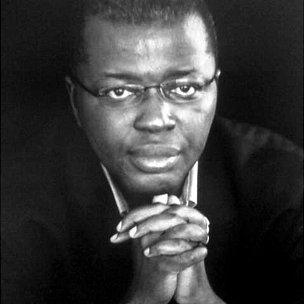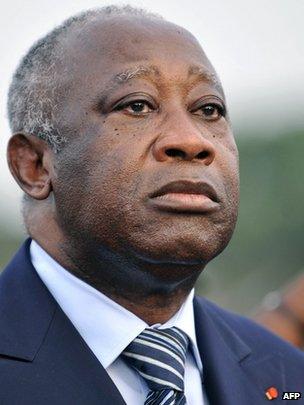Is Africa on trial?
- Published
The International Criminal Court (ICC) was set up to try those responsible for the most serious crimes in the world - such as genocide, crimes against humanity and war crimes.
So far, all 24 people facing charges - and the only person convicted - are from Africa, leading to accusations of bias. The African Union has said members countries should stop cooperating with the Court.
We asked two experts whether Africa is on trial.
NO

Abdul Tejan-Cole says the African victims of war crimes welcome the perpetrators facing justice
Abdul Tejan-Cole is a former prosecutor at the Special Court for Sierra Leone.
Two weeks ago, the International Criminal Court (ICC) handed down its first judgment - finding Thomas Lubanga Dyilo guilty of war crimes in eastern DR Congo. While the decision was rightly hailed around the world as a landmark for international criminal justice and the fight against impunity for mass crimes, it also reignited the debate about the ICC and Africa - and particularly the notion that the continent is somehow "on trial".
It is a version of events that has increasingly come to dominate the debate in Africa with political leaders past and present publicly accusing the ICC of anti-African bias and of persecuting the continent through its prosecutions. But it is almost certainly not the view of the majority of Africans, who want the political and military leaders responsible for international crimes brought to justice.
And it is definitely not the view of the victims of mass crimes - such as the 129 who participated in the Lubanga trial - who know that their national courts are invariably unable or unwilling to prosecute. And who celebrated when the ICC announced its landmark verdict.
Lubanga is the first person to have been convicted since the ICC was established in 2002. The Court found him guilty of enlisting, conscripting and using child soldiers between 2002 and 2003 when he was Commander-in-Chief of the notoriously brutal Patriotic Forces for the Liberation of Congo (FPLC). Multiple witnesses testified that Lubanga used these children as his bodyguards and that girl soldiers were subjected to sexual violence and rape.
But even as his victims were finally seeing justice being done, critics were condemning the ICC for taking so long and for costing so much, and castigating the prosecutor for not charging Lubanga with sexual violence crimes, despite allegations that women and girls were raped and abused by his forces. Others were wondering when some of Lubanga's co-perpetrators, notably his Rwandan deputy, Bosco Ntaganda, might face trial.
Until his conviction, Lubanga was one of 25 people facing trial in 14 different cases before the ICC. All 25 are Africans. This has generated increasing criticism. The African Union Chair, Jean Ping, has accused the ICC of targeting African leaders unfairly, while the Rwandan President, Paul Kagame, dismissed the Court saying it was made for Africans and poor countries.
'White man's Court'
Africa played a tremendous role in the establishment of the ICC, and only 11 African countries have not signed the Rome Statute while 33 have ratified its provisions, making Africa the most heavily represented region in its membership.

Ivory Coast's Laurent Gbagbo ratified the ICC treaty but is now on trial at The Hague
Three of the seven current situations under investigations by the Court - DR Congo, Uganda and the Central African Republic - were self-referrals to the Court by the respective governments. According to the Court's incoming Prosecutor, The Gambia's Fatou Bensouda, "the high rate of referrals in Africa could just as easily show that leaders on the continent were taking their responsibilities to international justice seriously."
Only two situations - Kenya and Ivory Coast - were opened at the instance of the prosecutor. The Kenya situation was opened after Kofi Annan, Chairman of the AU Panel of Eminent African Personalities, handed over a sealed list of suspects to the ICC and after the Kenyan parliament dithered over the establishment of a national tribunal.
In Ivory Coast, it was former President Laurent Gbagbo who accepted the jurisdiction of the ICC in April 2003 under the provisions of Article 12 (3) of the Rome Statute.
Like many other African leaders, Mr Gbagbo was quick to accept the jurisdiction of the Court so that it could prosecute rebels.
However, as soon as he was arrested and hauled off to The Hague, his supporters immediately began referring to the ICC as the "White man's Court" and complaining about its "neo-colonialist" and "imperialist" agenda.
'Western interests'
Contrary to popular opinion, the ICC is not a court of first resort. Entrenched in its statutes is the principle of complementarity - the ICC can only exercise its jurisdiction where the State Party of which the accused is a national or on whose soil the alleged crime was committed, is unable or unwilling to prosecute.
Many African countries will be unable to prosecute even if they want to because their judiciaries lack the capacity to prosecute the crimes in the Rome Statute and because their parliaments have failed to domesticate the relevant laws.
In the case of Kenya, even though Kofi Annan and others supported a "Kenyan-owned and Kenyan-led process", the country's parliament failed to pass the necessary laws to create a Special Tribunal thus giving the ICC jurisdiction.
Even though its criteria for selecting situations does not include geographical considerations, the perception that the Court is only targeting Africans will remain until it launches its first non-African prosecution.
And while it is true that the ICC can be lambasted for inconsistent case selection, there is not a single case before the Court that one could dismiss as being frivolous or vexatious.
They might all be African but they are also all legitimate. It is farcical that we can equate the trial of 25 accused with the trial of an entire continent.
Greater balance
In addition, the Court is currently analysing at least five situations outside Africa - including Afghanistan, Colombia, Georgia, Honduras and South Korea - all of which are awaiting determination by the prosecutor as to whether or not to open formal investigations.
The Palestinian National Authority has also petitioned the ICC prosecutor to accept jurisdiction over alleged crimes in Gaza from 1 July 2002, when the Rome Statute entered into force.
The Court has certainly made some missteps in its first decade. For example, the judges in the Lubanga trial were far from impressed by the prosecutor's use of intermediaries during the investigation.
And there is clearly a need to ensure greater balance in the geographical scope of the ICC's investigations and prosecutions. But there is not a case before the Court that critics can honestly argue should not be there.
And ordinary Africans are not complaining. Many have suffered at the hands of the perpetrators of mass crimes - and know that there is little chance that they will see justice done without international tribunals like the ICC.
Victims of the alleged atrocities of Chad's former President, Hissene Habre, have for several years been lobbying the Senegalese government to ensure that justice is done - but to little avail.
Had Mr Habre's alleged crimes been committed after 1 July 2002, his victims may have had their day in court just like Lubanga's.